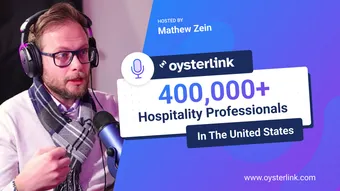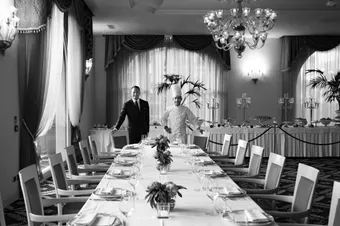Who is Meymuna Hussein-Cattan?
Meymuna Hussein-Cattan, a 2022 Top 10 CNN Hero and 2024 Los Angeles Times CEO Visionary and 2024 L'Oréal Paris Woman of Worth, is an executive leader and culturally conscious motivational speaker. She is the founder of The Tiyya Foundation and Flavors From Afar, a Michelin Bib Gourmand restaurant in East Hollywood.
Why did you choose social entrepreneurship in the hospitality industry?
Meymuna: Growing up, I saw firsthand how hard it was for my parents, who were refugees from Ethiopia. I was born in a refugee camp in Somalia, and when we started over in the U.S., it was really tough for them because they didn’t have any support. I watched how difficult it was for them to settle here. But I was lucky to find mentors and ask the right questions, which helped me get to where I am today. Now, I want to make it easier for the next wave of refugees coming in.
I think food is a universal way of preserving culture. No matter where people live, they tend to keep their recipes and traditions from back home. The hospitality industry just made sense—it was a way to create opportunities for people, especially refugees.
Initially, we started as a nonprofit, but it wasn’t sustainable. We had to figure out ways to generate revenue, and food became the solution. It was through working with families and focus groups that the idea of a restaurant came about. Now, it’s not just about providing income; it’s also about creating a space where people can share their cultures.
Can you tell us a bit more about your restaurant’s concept?
Meymuna: I always noticed that many refugee women were working in kitchens, but it was always someone else’s menu. At home, they were creating unique dishes, but that wasn’t reflected in the restaurants they worked at. So, I wanted to bridge that gap. At our restaurant, Flavors from Afar, which has been recognized by the Michelin Guide for three years in a row, we focus on showcasing these chefs and their recipes. The business model ensures they have a passive income. The chefs teach us their recipes, we do the labor, and they get a percentage of the sales. This way, they earn royalties and are acknowledged for their skills. It’s about making them the teachers in the kitchen and offering unique dishes that people might not find elsewhere.
So, do you rotate these dishes throughout the year?
Meymuna: Yes, we rotate the dishes monthly. Currently, we’re doing a global summer series where we introduce different cuisines every week. Moving forward, we plan to highlight a cohort of chefs for a full month. We also offer catering, so people can order these dishes year-round. Soon, we’ll have a catalog where people can explore dishes by country, which will make it even easier to try something new.
What do you look for in the people you hire?
Meymuna: For our concept, humility is key. I need people in the kitchen who understand that these dishes aren’t theirs. We didn’t create this menu; we’re here to preserve the authenticity of the recipes the chefs teach us. It’s important that our staff respects that and ensures the dishes stay true to the chefs’ instructions.
Does that ever limit creativity for your staff?
Meymuna: Sometimes, yes. Some might feel a certain spice could enhance a dish, but more often, there’s an excitement about learning new recipes. Our team is constantly learning and rotating through different cuisines, which keeps things interesting for them. They don’t have to travel to five different countries to learn—every few months, they’re working with something entirely new.
What’s the best question to ask someone during an interview to figure out if they’re the right fit for your team?
Meymuna: That's a great question. I think it comes down to the energy they bring to the interview. Do they genuinely want to be here? Are they honest about their intentions, like if they’re just looking for something temporary while they're in school, versus pretending they want something long-term? I really appreciate when people are straightforward about what they can contribute and what they expect. I’ve interviewed so many people, and some are great in the interview but not at the job, and vice versa. So it's always a bit of a gamble. You let them know it's a 90-day trial, and take your time onboarding them. If they’re not a fit, it’s best to let them go quickly before it affects the business.
Is turnover an issue for your restaurant?
Meymuna: There was some turnover when we moved locations. We used to be in Little Ethiopia, and then moved to East Hollywood. The renovations took about a year, and that caused some shifts. But I have team members who have been with me since I started catering back in 2018. Some have transferred with me to the restaurant, and some are new. It was a big ask to have people wait a year while we renovated, but some did, and I’ve got a mix of seasoned and newer team members now.
How do you manage to retain your team?
Meymuna: Honestly, I should ask them why they still deal with me! But I think it comes down to the work atmosphere. My background is in organizational development, so I study the psychology of the work environment, and I try to apply that.
It's about the culture you create and whether team members trust each other. Having a feedback loop is also important—they should have a say in their job. I keep a working Google Doc where I add all the feedback I get, whether it’s about needing more dessert spoons or rearranging the kitchen.
Everyone’s opinion matters, and I think that’s why people stick around.
How do you see the hospitality industry changing?
Meymuna: The biggest change is the rising cost of ingredients, of course. At the same time, it doesn’t affect only the business, but cost of living is high too. And our people need to live well, especially in places like Los Angeles, so we can’t undervalue their work. What has worked for me is offering flexible, on-call staffing. Many of our team members have other jobs, and I let them know when we have available hours. This allows them to pick up shifts without being tied to a fixed schedule, which seems to work better than the traditional 20 to 40 hours a week model.
You also offer catering. Has that changed much recently?
Meymuna: Yes, catering is actually very lucrative, often more so than regular restaurant service. We have a big enough audience now that people consider us for events, especially when they want an ethnic or multicultural experience. For example, we’ve catered weddings for mixed-race couples who want both their cultures represented. They know they can come to us, and we’ll handle it all.
Do you think the younger generation, like Gen Z, is changing the kitchen dynamic?
Meymuna: I think Gen Z wants to work, but they want it to be meaningful. They value their time and freedom. For them, wealth isn’t just about money; it’s about having the freedom, time and mobility.
I enjoy working with all generations, but Gen Z really stands out to me as innovative and eager to make an impact. They’re excited to be part of something that makes a difference.
Do you think the same shift is happening with customers? Are people more interested in trying new and diverse cuisines now?
Meymuna: Absolutely. In the past, introducing new cuisines could be off-putting for some people, but now there’s a real curiosity. Customers want to try something new, but they also expect good value for what they’re paying. They love talking about their experiences with food, especially when it’s tied to their travels. Now, they come in and try dishes from places like Zimbabwe, Sudan, or the Congo, and they love being able to share those experiences with others. It’s become a point of pride for them.
What advice would you give to an aspiring restaurateur?
Meymuna: Be prepared for unexpected and calculate everything beforehand. A customer situation or an employee who has to call out for the night—that can affect service. Then there's putting aside money for renovations or replacing broken items. The list is endless, but honestly, I love it here.
I love this work. I feel like I'm hosting a dinner party all the time, giving people new experiences and opportunities for their palate. Sure, if you just look at the numbers, it might not make sense, but it’s not about the numbers.
If you wanted to just make money, you'd probably invest in stocks or something else. But that's not what drives me.
What advice would you give to someone just starting in the industry—like a dishwasher or line cook—who wants to build a career in hospitality?
Meymuna: My advice would be, no matter what job you get, take it seriously. Put care and effort into it. People notice not only what you do but also how you do it and how you operate as a team member. That’s where you start getting opportunities to excel. And remember, you were the one who applied for that job. So honor your decision and give quality to what you’ve chosen to do. Sometimes people forget that it was their decision to be there in the first place, and that’s where they get in their own way.
Do you think the work environment in the restaurant industry as a whole is improving?
Meymuna: Oh, definitely. You used to hear a lot of horror stories about how people were treated in kitchens, but I think more and more people are creating healthier environments for their staff now. As a restaurant owner, you’re not just developing a culture for your team but also for the neighborhood around you. There are so many great restaurants out there with amazing reputations and cultures.






Loading comments...